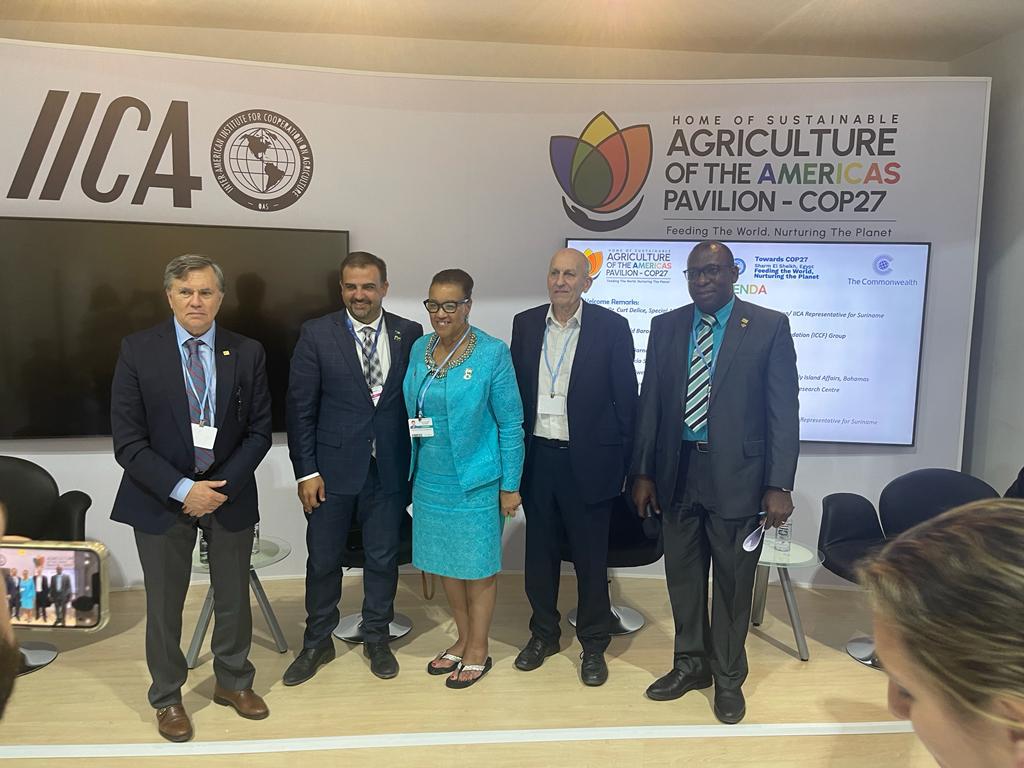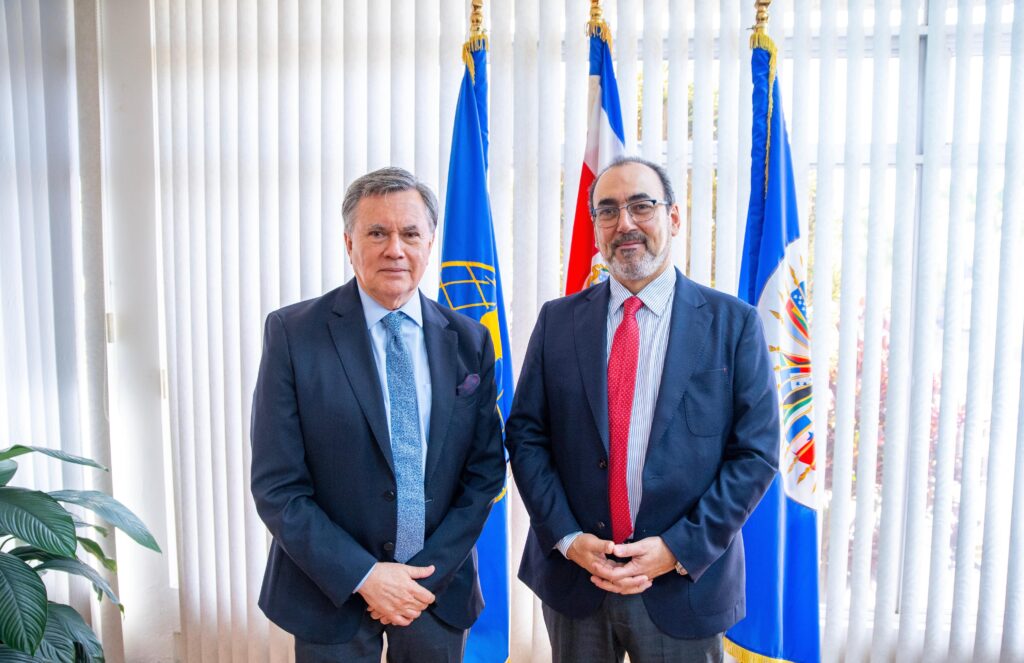La Commonwealth es una mancomunidad de naciones de distintas regiones del planeta que comparten lazos históricos con Gran Bretaña y se proponen favorecer la cooperación internacional en los ámbitos políticos y económicos.

Sharm El Sheik, Egipto, 9 de noviembre de 2022 (IICA) – Los integrantes del Commonwealth, entre los que se cuentan distintos países del Caribe, deben intensificar su trabajo conjunto para garantizar la resiliencia de su agricultura y la seguridad alimentaria de sus poblaciones, dijeron expertos de esa mancomunidad de naciones reunidos en la Casa de la Agricultura Sostenible de las Américas, el pabellón que el Instituto Interamericano de Cooperación para la Agricultura (IICA) instaló en la COP27, que comenzó esta semana en Egipto.
Las naciones del Caribe se cuentan entre las más vulnerables al cambio climático en el mundo, debido a la mayor frecuencia e intensidad de desastres naturales, como huracanes e inundaciones, y al aumento del nivel del mar. Esto ha significado nuevos desafíos para los pequeños agricultores, que sostienen la amenazada seguridad alimentaria en estos países.
“Países del Commonwealth: creciendo juntos para la resiliencia climática y la seguridad alimentaria y nutricional”, fue el título del panel, que atrajo la atención en medio de la gran cantidad de actividades que tienen lugar en la Cumbre.
La Commonwealth es una mancomunidad de naciones de distintas regiones del planeta que comparten lazos históricos con Gran Bretaña y se proponen favorecer la cooperación internacional en los ámbitos políticos y económicos.
En el debate participaron Clay Sweeting, Ministro de Agricultura y Recursos Marinos de Bahamas; Patricia Scotland, Secretaria General del Commonwealth y Harry Clark, Co-Director del Centro de Investigación de Gases de Efecto Invernadero de la Agricultura de Nueva Zelanda.
Curt Delice, Coordinador de Asuntos Especiales de la Región del Caribe y Representante del IICA en Surinam, fue el moderador, mientras que el Director General del IICA, Manuel Otero, dio las palabras de bienvenida y señaló la urgencia de concentrarse en mejorar la resiliencia de la agricultura del Caribe, castigada por los fenómenos meteorológicos extremos.
Cerrar las brechas
Sweeting, ex pescador, señaló que Bahamas importa entre el 90 y el 95% de los alimentos que consume su población, lo que obliga a invertir más de 1.000 millones de dólares al año.
También se refirió al problema que representa para su país la falta de renovación generacional en la actividad agrícola.
“El 80% de nuestros agricultores tiene más de 60 años. Hemos perdido una generación para la producción de alimentos y es urgente que diseñemos políticas públicas para cerrar esa brecha. Otra señal negativa es que mientras la mayor parte de la población vive en la isla de New Providence, casi toda la agricultura se realiza en otras islas de Bahamas”, dijo el ministro.
Sweeting señaló la importancia de que los países del Commonwealth compartan especialmente lo referido a la incorporación de innovación y tecnología a la agricultura, para atraer a las nuevas generaciones. “La realidad -advirtió- es que los jóvenes no se involucran y debemos concentrarnos en solucionar ese problema, porque la agricultura no sólo se trata de generar ingresos, sino de garantizar la seguridad alimentaria. Hoy, debido a la pandemia de Covid-19, el mundo se ha dado cuenta de la centralidad de la agricultura”.
Patricia Scotland consideró que la agricultura debe ser atractiva para los jóvenes y que eso se consigue acelerando la transición hacia la digitalización.
“Es muy importante que los 56 países del Commonwealth trabajemos juntos. La seguridad alimentaria se construye dentro de los límites de cada país, pero necesitamos compartir información sobre lo que cada país produce para complementarnos”, dijo Scotland.
Agregó que la agricultura también es sumamente importante para los países del Caribe desde el punto de vista económico y social, debido a que emplea al 9% de la población y genera el 14% del Producto Interno Bruto (PIB).
Clark contó la experiencia de Nueva Zelanda en cuanto a la reducción del impacto ambiental de la agricultura y consideró que su país puede unir esfuerzos con los del Caribe para mejorar la resiliencia de la producción de alimentos ante el cambio climático.
“Muchas veces la política y la ciencia no interactúan bien. En muchos países no se ha conseguido que hablen en el mismo idioma. Es compleja la ciencia y debe ser traducida para que sea algo entendible. Los científicos tienen que salir de su torre de marfil y los políticos tienen que dejarse guiar por las evidencias”, dijo Clark.
El experto agregó que, más allá de la centralidad de desarrollar innovación y tecnologías, las soluciones deben ser locales y deben incorporar los conocimientos ancestrales.
El pabellón Casa de la Agricultura Sostenible de las Américas, que el IICA instaló en la COP27, es un espacio para la agricultura sostenible y los sistemas agroalimentarios de las Américas que exhibe el rol clave del sector agropecuario para las soluciones climáticas y la seguridad alimentaria mundial, al tiempo que busca visibilizar las contribuciones de productores y otros actores del sector en la adaptación y mitigación del cambio climático.
Desde el inicio de la COP27, altos funcionarios latinoamericanos, representantes del sector privado y de organismos internacionales visitaron y participaron de actividades en el pabellón, ubicado en el Centro de Convenciones de Sharm-El-Sheik, epicentro de la Cumbre climática global, y que funciona con el lema “Alimentando el mundo, cuidando el planeta”.
La Casa de la Agricultura Sostenible de las Américas cuenta 26 socios estratégicos de diferentes sectores, entre ellos del productivo como el Consejo de Exportadores de Lácteos de los Estados Unidos (USDEC, por sus siglas en inglés) y Protein Pact; aliados clave del IICA del ámbito privado en la iniciativa Suelos Vivos de las Américas como Bayer, Syngenta y Pepsico; además de organizaciones de la industria de la ciencia de los cultivos como CropLife International, entre otros.
Más información:
Gerencia de Comunicación Institucional
comunicacion.institucional@iica.int










